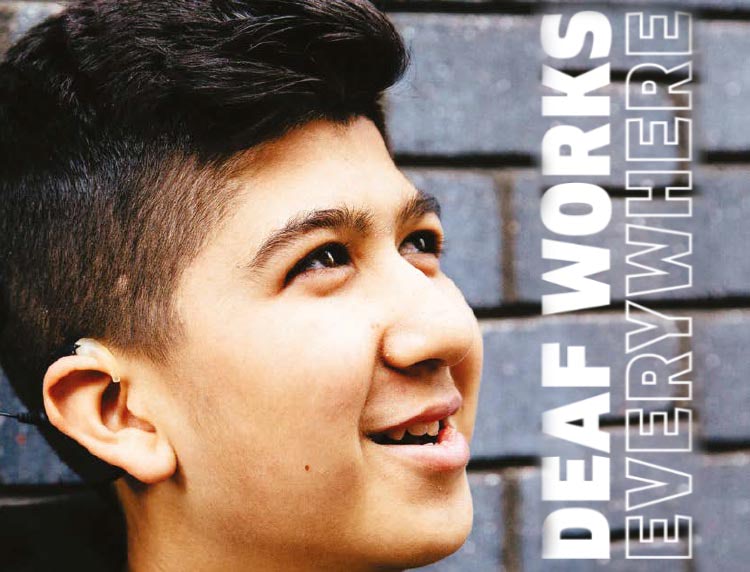2 in 3 deaf young people would hide deafness on job application

@NDCS_UK – #CareersAdvice for deaf young people across the country is not up to standard, leaving them unprepared for the world of work
Two in three deaf young people would hide their deafness on a job application because they fear it would harm their chances, according to a new report from the National Deaf Children’s Society.
Deaf Works Everywhere, based on in-depth research with over 100 deaf young people, also says that deaf youngsters are being left to fend for themselves because career advice is badly tailored, outdated and unfit for purpose.
The report, written for the charity by deaf young activists who visited schools and colleges across the UK, reveals that 63% of deaf young people interviewed would hide their deafness on job applications because they fear they’d be overlooked for the position otherwise.
It also shows that almost half (45%) feel they aren’t being supported by their school or college when thinking about choices for the future. In addition, nine in 10 (90%) aren’t aware of Access To Work, the UK Government-funded grant for disabled people to spend on support at work like accessible equipment, technology or interpreters.
Deaf people are already twice as likely to be out of work as hearing people. According to an Equality and Human Rights Commission report, 36.4% of deaf people were employed in 2015/16, compared to 73.3% of all people.
The Deaf Works Everywhere report also includes some shocking excerpts from interviews with deaf young people, with some angry at other people’s low aspirations for them.
One said: “I went to a careers fair and someone was there from the police.
“They said, ‘You are deaf, you cannot work for us’. But my dad is deaf and he works for the police.”
Another said: “I really want to be a watchmaker. My teacher told me that people would not understand me so I couldn’t do that job.”
They also spoke of struggling on work experience placements due to a lack of deaf awareness.
One said: “I was too nervous to say that I couldn’t understand them. I never told them I was hard of hearing and just kept missing conversations.”
Another added: “Basically I feel like I am the problem, but I know that isn’t true. It is the situation that is the problem, but I’m deaf and in the centre.”
The report says that although deaf young people have the same rights to good quality careers advice and support as hearing people, they often have negative experiences and don’t receive the same opportunities to move into work.
In response, the National Deaf Children’s Society is calling on local authorities, schools, colleges and Governments across the UK to work together to ensure that deaf young people receive specialist careers advice.
The charity says that advice must be tailored to include information about deaf-specific support and technology, and be more accessible, taking into account the range of communication needs deaf young people have.
The report is part of the National Deaf Children’s Society’s new campaign, Deaf Works Everywhere, to get more deaf young people into work – and into jobs that inspire them.
Martin McLean, Policy Advisor at the National Deaf Children’s Society, said:
“This report should come as a huge wake-up call to everyone who has an influence on deaf young people’s lives.
“Deaf young people have an incredible amount to offer and they’re perfectly capable of doing the same jobs as their hearing friends, but they’re being left to fend for themselves because careers advice is either non-existent or totally inaccessible.
“Schools, colleges and local authorities need to urgently improve the quality of support they’re offering because many of them just aren’t delivering for deaf young people.
“Until this advice is up to scratch, deaf young people will continue to battle the odds to get a job without any idea of the additional support they could get, missing out on their dream careers and hiding their deafness along the way.”
Jovita Bodamer-MacGregor, 15, from London, is one of the report’s authors. She said:
“This is extremely important to me because careers advice is one of the things that we don’t get support with. The report and the campaign are going to raise awareness and give deaf young adults a much better idea of their rights in the working world. I strongly believe this needs supporting.
“My message to all deaf young people is be confident and be strong, you can be whoever you want to be.”











Responses